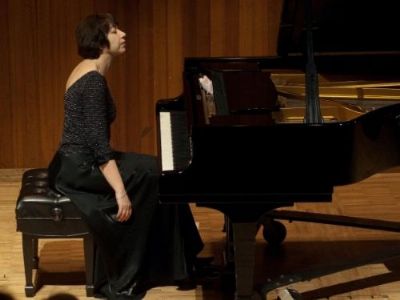|
Symphony
FROM THE NEW WORLD TO THE OLD WORLD
by Peter Lert
Saturday, June 14, 2025
Chamber
MC2 DUO RECITAL CLOSES 222'S SEASON
by Terry McNeill
Saturday, June 14, 2025
Choral and Vocal
CANTIAMO SONOMA'S LUSCIOUS A CAPELLA SINGING IN SEASON ENDING CONCERT
by Pamela Hicks Gailey
Sunday, June 8, 2025
Symphony
SRS SEASON ENDS WITH RESOUNDING TA-TA-TA-BANG
by Terry McNeill
Sunday, June 1, 2025
Symphony
YOUTHFUL VIRTUOSITY ON DISPLAY AT USO'S MAY CONCERTS
by Peter Lert
Saturday, May 17, 2025
Symphony
MYSTICAL PLANETS AND LIVELY GERSHWIN ORTIZ AT FINAL SRS CONCERT
by Peter Lert
Sunday, May 4, 2025
Symphony
VSO'S CONCERT MUSIC OF TIME, MUSIC OF PLACE
by Peter Lert
Sunday, April 27, 2025
VOCAL ELEGANCE AND FIRE AT THE 222'S RECITAL APRIL 26
by Pamela Hicks Gailey
Saturday, April 26, 2025
CANTIAMO SONOMA SINGS AN INSPIRED GOOD FRIDAY MOZART REQUIEM CONCERT
by Pamela Hicks Gailey
Friday, April 18, 2025
DRAMATIC SHOSTAKOVICH SYMPHONY CLOSES PHILHARMONIC'S 25TH SEASON
by Terry McNeill
Sunday, April 13, 2025
|
 |
 Elena Kuschnerova at the Newman Auditorium Piano |
FROM RUSSIA WITH LOVE
by Terry McNeill
Sunday, March 1, 2009
People attending pianist Elena Kuschnerova’s March 1 Newman Auditorium concert came with anticipation of a challenging afternoon, as the Russian’s presence on YouTube and a comprehensive website disclosed a wide range of repertoire and powerful command of the instrument. I don’t believe anyone was disappointed.
Part of the Concerts Grand series, the recital’s first section was all German, appropriate as Kuschnerova lives in Baden Baden, and it’s the 200th anniversary of the birth of Felix Mendelssohn. The Variations Serieuses, Op. 54, and three of the Songs Without Words were performed with richly contrasting textures and a long lyrical line. The songs (May Breezes, Lost Illusions, and Spinning Song) received warm readings with a delicate touch and sprightly agility. The variations were played with consummate pianistic skill, notably the fugal (No. 10) and the following Schumannesque (No. 11). Everything was in place with technical dash, the descending left-hand figurations in the 15th variation resounding deep into the bass. Mendelssohn never wrote a better work for piano, and Kuschnerova gave a grand reading.
Bach’s Second French Suite began the program. Kuschnerova played it in a carefully measured way, the architectural backbone surrounded by sparkles of notes, all held together by clear delineation of each of the voices. The fast Corrente was deftly played and the two-voice Gigue’s dotted notes received an attentive performance in decorous Baroque style.
Kuschnerova chose only Russian composers for the second half, running a chronological gamut from the first great one (Glinka) to the controversial Alexander Lokshin (1920-1987). Glinka’s lovely short Nocturne La Separation mirrors Field’s works of the same title, less complex and deep than Chopin’s oeuvre, but no less lyrical. Tchaikovsky’s Variations on an Original Theme, Op. 19, followed, and its 16-measure theme was nobly stated. The quirky third variation was brilliantly played, the alla mazurka ninth danced provocatively, and the conclusions of the fleet coda brought down the house.
The pianist preceded Alexander Lokshin’s In The Spring and Prelude and Theme with Variations with an extended summary from the stage of Lokshin’s tragic life under Soviet rule. Kuschnerova knew the composer, and her sympathy with his plight was palpable. In the Spring, a poetic 45-bar bagatelle, was lovely, and the variations were sharply dissonant and assured. A good number of the 85 in the audience stood to applaud, a novel demonstration for an unknown composer’s work, and certainly a tribute to Kuschnerova’s passionate advocacy. Lokshin’s music has had few champions, the conductor Rudolph Barshai now being joined by Kuschnerova in heralding a Soviet-era master.
Closing a memorable concert was the tumult of Stravinsky’s Trois Mouvements de Petrouchka, virtuoso paraphrases of three scenes from the famous ballet of 1920. This polytonal transcription ranks with a handful of piano works (e. g., Liszt’s Tannhauser Overture, Balakirev’s Islamey, and Ives’ Concord Sonata) as the most difficult to play on the modern piano. Kuschnerova, who was not well during the entire recital, rose to the pyrotechnical demands of the Danse Russe and La Semaine Grasse magnificently. She seemed to tire towards the end, losing small details in the volleys of forte octaves, march-like chords and incessant bravura.
Three encores were offered, the best being another Mendelssohn song (Passion) and Siloti’s transcription of the Bach Prelude in B Minor. The latter was a richly colored example of captivating legato playing.
Elena Kuschnerova communicated in a personal way with her Newman audience, serving the composers she chose to perform and exemplifying the majesty of the great Russian romantic piano tradition.
Marin pianist Ken Iisaka contributed to this review.
|

